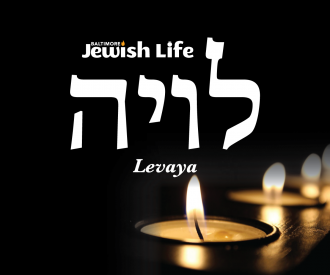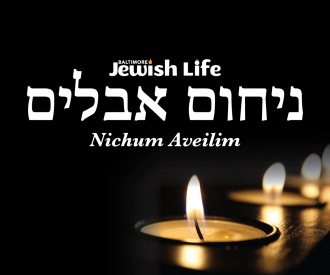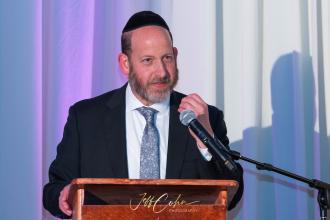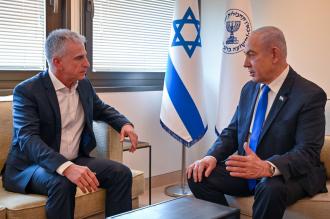The Zohar depicts the nature of our celebration of the holiday of Sukkos as children who shelter themselves in the warmth of their mother’s protective embrace.
This relationship is referred to as the אמא עילאה — the Higher Mother.
The saintly Reb Mordechai of Neshchiz explains, that this intimates man’s ability to repent from his sins, finding refuge ‘in the apron strings of his mother’, from those who seek to persecute him.
But isn’t Teshuva an erasure of one’s past misdeeds through meaningful regret and repentance, without any need to ‘escape’ the intentions of those who seek to harm him?
After the sin of partaking from the Tree of Knowledge, the Torah enumerates a series of curses that will befall man and woman because of their poor choice they made.
Strangely, it is first after Chava is cursed that G-d will ‘...increase your anguish and your pregnancy. It will be with anguish that you will give birth to children’, that Adam confers upon her the unique name Chava ‘because she was the mother of all life’ — the name חוה stemming from חיה, life.
Wasn’t she destined to mother children even before the sin?
What does it mean she is the ‘mother of all life’? Animal life did not descend from her. Additionally, by what virtue is she more the ‘life-giver’ than man who also must participate in the creation of progeny?
Famed Israeli journalist, Shimon Breitkopf, shared upon the recent first yahrtzeit of his mother, an inspiring story she experienced many decades ago.
As a young mother with little children, she had moved from Bait v’Gan to Har Nof, and was determined to celebrate the joyous move with a Chanukas haBayis, even though the boxes were barely unpacked, and the apartment was far from settled and furnished. She planned a small family get together to express gratitude to Hashem for her good fortune. Her husband had a dear friend who was a follower of Reb Shlomo Carlebach, who suggested that he could get Reb Shlomo and some of his chevra to join and add some extra life to the party. He mentioned the idea to his wife who graciously consented, only to discover that the small group burgeoned to nearly seventy people cramming their new apartment. Somehow the family scrambled to put together enough food for everyone, warmly opening their hearts and home to the many forlorn souls that straggled along.
Reb Shlomo was overwhelmed by the remarkable generosity of this woman. When she apologized for the inadequacy of the setting and sophistication of food, he shared with her his sentiment that the hallmark of a inspired home is not indicated by the decor or fare served, but is defined by the fact that everyone who enters its portal feels welcome, and is longed for after they leave. She was touched by his kind words and mentions in passing that she is the niece of his dear friend, Shaul Eisenberg, her mother’s brother.
Upon hearing this Reb Shlomo gets excited and revels over what a remarkable person her uncle is. He, like Reb Shlomo, was a young man when they escaped their country of birth, Germany, before the inferno that consumed the continent. Shaul fled to Japan and utilized his many talents in building a financial empire there. Retaining a strong identity as a Jew and supporting many Jewish causes, he eventually was lured back by the government to join his greater family in Israel, realizing how valuable he would be as a contributor to the developing nation, both financially and through his many vital contacts for the benefit of the State of Israel.
Reb Shlomo then shared a personal story.
As best friends, Shaul always invited Reb Shlomo to all his children’s weddings. After one wedding, Shaul pulls out a thick envelope of cash, generously providing for Reb Shlomo’s travel expenses plus. Reb Shlomo refuses to accept it telling Shaul to keep it. Surprised, Shaul inquired about his reluctance. Reb Shlomo tells him how after the last child’s wedding he attended, he took the money but after leaving was accosted by a poor and desperate beggar, who refused to accept anything but the entire envelope of cash, crying that he was in desperate need to support his large family. Reb Shlomo’s big heart agrees but asks the beggar to leave him with a few hundred dollars to pay for his taxi and hotel stay. The poor fellow tells Reb Shlomo how an extra few hundred dollars is small change for him but will provide vital sustenance to his own family staving off literal hunger. Reb Shlomo gives him every penny. He then tells Shaul he had better give him a check, or he will end up empty handed again.
After hearing Reb Shlomo sharing his pain, Shaul too, shares something that has been weighing heavily in his heart. As a wealthy and generous man, Shaul is besieged by many people in need. One very prominent rabbinic figure approached him and received a significant donation. After thanking him, but before taking leave, the person turns to Shaul telling him that although he accepted the money in no way does he justify or approve the lifestyle of the rich and famous that Shaul lives. Shaul recalls how despite the insult, he did not ask for the money back, nor did he utter any reprimand for his caustic remarks. He questioned out loud to Reb Shlomo, wondering how someone can be so ungrateful and cruel.
Reb Shlomo assured Shaul that he should not feel down as he had endured a most difficult life being uprooted so young, yet had maintained a strong Jewish identity, supporting selflessly so many worthy causes. Shlomo then looks Shaul deeply into his eyes and tells him the following.
“You know when that beggar badgered me leaving me penniless, I was quite upset, but then it struck me. What would happen if this poor soul’s mother appeared to me? What would she say? I imagined that she would tell me that her son is really a good man. He is devoted to his family, willing to grovel for help, forfeiting his dignity, because he is dutiful to them and cares so much. And you know, she is right! After that revelation I ran to find him and embrace him, acknowledging the holy soul he is.
Shaul, how do you think the mother of this rabbi would perceive the situation. Certainly, she would apologize for his insensitivity, but she would tell you how devoted he is, how principled he is, never veering an iota from his strong beliefs, living a life consistent with his ideals.”
Shaul was eased, suddenly recollecting his own dear mother, her warmth and understanding, and asked Reb Shlomo to bless his newlyweds that they should merit that nurturing and emulate it in their home.(Mishpacha Magazine Hebrew Edition Sukkos)
Adam knew that the curse placed upon Chava was not a punishment but a path towards rectification.
After falling, man is in danger of remaining dejected. It is only through the power of a mother — who can endure suffering yet frame it with positivity, plunging forward despite the pain — that a child can be resilient despite having fallen.
Chava had the power not only of generating life within her, but more importantly to continue to infuse her children with vitality through the many subsequent trials and travails they are destined to face.
The title אֵם, consists of two letters. An א, represents primacy. The מ is always used to imply ‘from’. A mother has the gift to never lose focus of where we come from, prodding it towards its noble potential.
A mother can encourage, uplift, inspire, even the lowliest, to peer into their greatness and act on it in bringing it to fruition.
She was called חוה as opposed to חיה, since the former implies constancy, while the latter focuses just on the birth.
She is the mother of all joyous and inspired life! (העמק דבר)
We attempted to repent, and hopefully retain our commitments, but even when we continue to falter at times, we find solace in the apron strings of our ‘mother’, who points out how wonderful we are and how much greater we will become. She can ward off the prosecuting angels by accentuating, as only a mother can, how good, we truly are.
We entered the embrace of the Sukkah into the joyous arms of our ‘Higher Mother’ knowing we are a source of Her joy no matter how far we have descended. We left that inspired abode on Shemini Atzeres, hearing our Higher Mother bemoan, קשה עלי פרידתכם/ ‘it is so difficult to part’, longing for our return.
Being a mother is not a biological description, it is an attribute we can all attain, in emulating our Higher Mother, who discerns our goodness, encouraging us to reach our great promise.
We must adopt the ‘nature’ of a mother, seeing others with that keen perceptive in a positive light, conveying joy over their presence, and letting them know how much we value them even when they are gone, longing to see them again.
באהבה,
צבי יהודה טייכמאן















